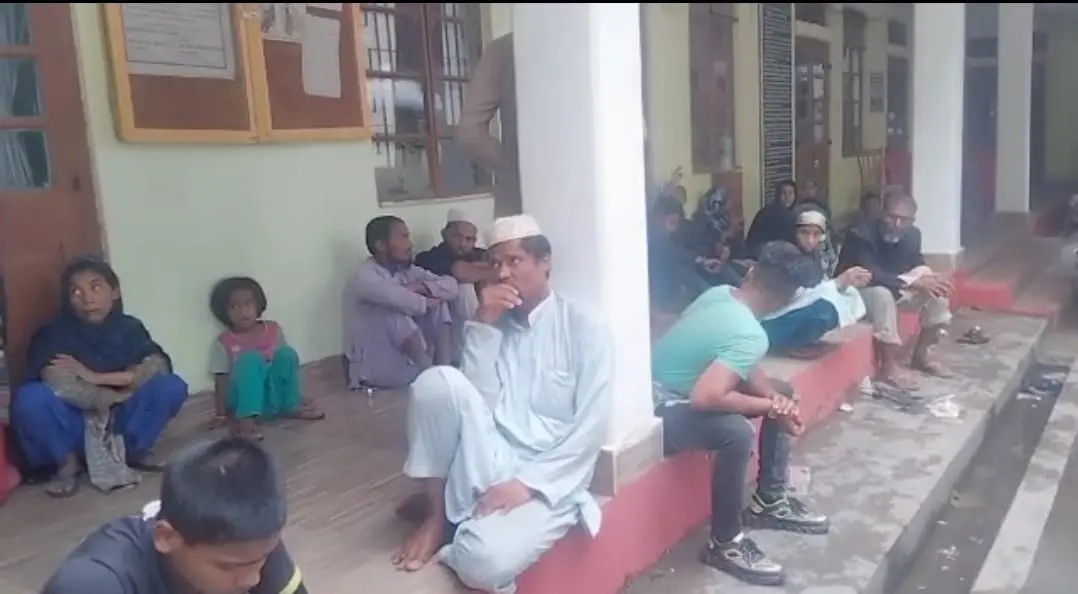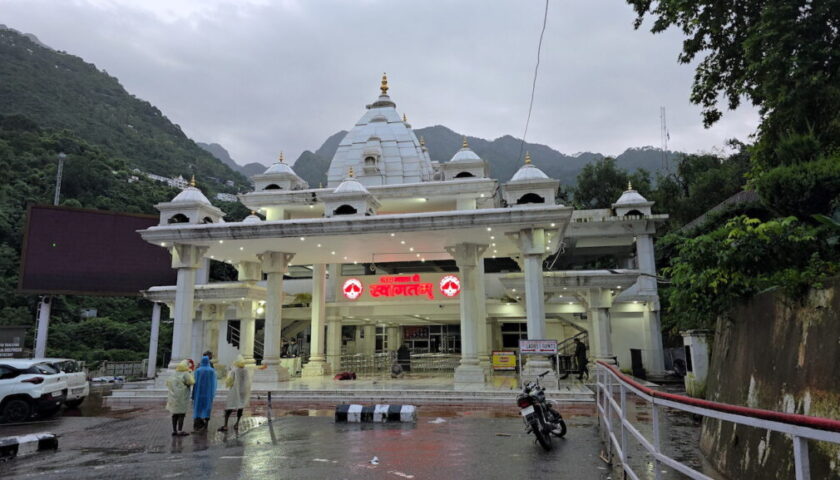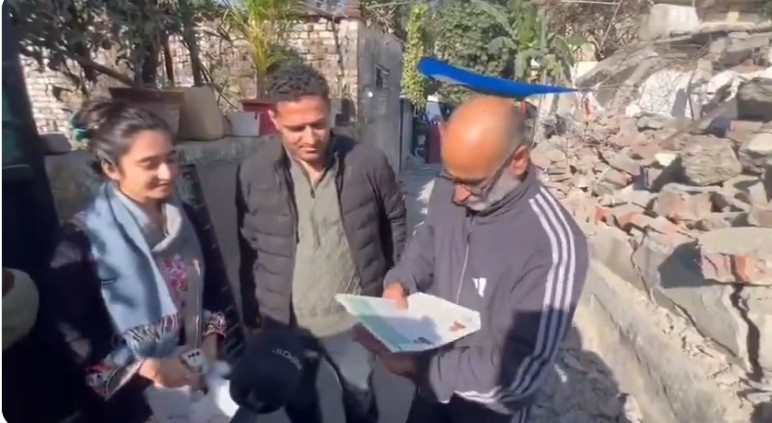Crackdown reignites debate over refugee policy, urban safety, and humanitarian balance in J&K
By: Javid Amin | 22 October 2025
In a decisive administrative action, the Jammu district administration has ordered the disconnection of electricity and water supply to a plot in Trikuta Nagar’s Nideesh Enclave, allegedly illegally occupied by Rohingya refugees. The move follows persistent complaints from local residents and a formal appeal by the Residents’ Welfare Association (RWA) demanding restoration of civic order.
Officials confirmed that the Tehsildar of Bahu issued written directives to both the Power Development Department (PDD) and the Public Health Engineering (PHE) wing earlier this week to terminate all utility connections serving the disputed site.
“The occupation has no legal sanction. Utilities cannot be provided to unauthorized structures,” a senior revenue official told Kashmir InFocus on condition of anonymity.
The order, though administrative in form, has rekindled a sensitive debate around refugee management, urban governance, and national security in the region — especially as the presence of Rohingya and Bangladeshi nationals continues to be a flashpoint in Jammu’s socio-political landscape.
The Location and the Complaint
The site in question lies within Nideesh Enclave, a relatively affluent locality of Trikuta Nagar, known for its planned layout and proximity to the Jammu Railway Station.
Residents claim that a cluster of makeshift huts appeared over the past few months on a private or state-owned parcel, with several families reportedly settling there without formal authorization or documentation.
The Residents’ Welfare Association (RWA) submitted a complaint to the local administration last month, flagging issues such as:
-
Unregulated electricity tapping from nearby poles,
-
Open defecation and sanitation hazards,
-
Overcrowding, and
-
Fear of property devaluation and “security risk.”
“We are not against any community, but this is an unauthorized settlement in a residential area. It creates civic and safety concerns,” said Rajesh Gupta, President of the RWA, speaking to The Daily Excelsior.
“We requested the administration to enforce the law, not to target anyone unjustly.”
Official Action: Directive and Enforcement
Following field verification, the Tehsildar (Bahu) submitted a report confirming unauthorized occupation and recommended immediate disconnection of all utility services.
On October 17, official letters were dispatched to:
-
Executive Engineer, Power Development Department, and
-
Executive Engineer, Public Health Engineering (PHE)
directing them to sever existing power and water connections within 48 hours.
A senior PDD official said the order will be executed “in accordance with legal provisions” and added that “electricity supply to illegal encroachments cannot continue indefinitely.”
The move aligns with district-level enforcement drives launched in recent months to reclaim encroached state and private land under the Jammu & Kashmir Land Revenue Act.
Wider Context: Rohingya Settlements in Jammu
According to official figures cited by the Union Home Ministry (2023), approximately 13,700 Rohingya and Bangladeshi nationals are currently residing in various pockets of Jammu, Samba, and Kathua districts.
Many entered India through the North-Eastern states and gradually migrated northward. Settlements exist in Narwal, Bhatindi, Channi Rama, and Trikuta Nagar, among others.
While humanitarian groups emphasize the refugees’ dire living conditions and lack of documentation, security agencies have repeatedly flagged the settlements as “vulnerable and unregulated.”
Security Concerns Cited:
-
Potential infiltration of non-genuine individuals amid refugees
-
Lack of biometric verification for many residents
-
Encroachments on government and private land
-
Pressure on civic infrastructure
In March 2021, the Ministry of Home Affairs (MHA) directed J&K authorities to identify, verify, and deport “illegal foreign nationals,” citing national security concerns. Over 270 Rohingya residents were detained that year and shifted to the Hiranagar holding center for verification.
Balancing Law and Humanity
The disconnection order has triggered mixed reactions among civil society groups, humanitarian organizations, and political observers.
Humanitarian Angle:
Groups like the J&K Refugee Rights Forum have expressed concern that cutting off water and power may violate basic humanitarian standards, particularly where children and elderly are present.
“Refugees, regardless of status, deserve humane treatment. Denial of water and electricity in harsh conditions is ethically questionable,” said Sajid Lone, coordinator for the forum.
They argue that instead of punitive measures, the administration should provide temporary shelters, legal aid, and coordinated relocation through the UNHCR framework.
Administrative Defense:
Officials, however, maintain that the action targets illegality, not ethnicity.
“No one is being evicted overnight. But utilities cannot legitimize illegal occupation,” said a district officer.
“We are following due process — surveys, notices, and inter-departmental coordination.”
Political Reactions: Divided Lines
BJP’s Position:
The Bharatiya Janata Party (BJP), which has consistently raised concerns over the “unregulated presence” of Rohingyas, welcomed the decision.
BJP J&K spokesperson Altaf Thakur said:
“This is not about religion or refugees. It’s about rule of law. Jammu’s demographic and security balance cannot be compromised.”
He also called for a comprehensive audit of foreign nationals residing across Jammu division, linking the issue to national security and urban management.
Opposition Response:
The National Conference (NC) and People’s Democratic Party (PDP) have adopted a cautious tone.
NC spokesperson Imran Nabi Dar said:
“Humanitarian sensitivity and administrative discipline must go together. While illegal encroachment is unacceptable, basic rights should not be denied.”
PDP leader Waheed Para added:
“The refugee issue is a humanitarian crisis, not a political slogan. J&K must handle it with constitutional and moral responsibility.”
The Congress urged the administration to coordinate with central agencies before enforcing further crackdowns, warning that “ad hoc actions may invite judicial scrutiny.”
Urban Pressure and Local Sentiment
Jammu’s urban population has expanded significantly in the past decade, placing pressure on land, water, and sanitation networks.
Many residents, while sympathetic to the plight of displaced communities, express frustration over unchecked encroachments and strain on civic services.
“We pay taxes for clean surroundings and regulated services. When unauthorized settlements grow, it affects all of us,” said Anjali Mehta, a resident of Trikuta Nagar.
“At the same time, the government should relocate refugees to safer, planned camps rather than cutting off their lifelines,” she added.
This dual sentiment — between law enforcement and compassion — reflects the complex moral terrain local administrators must navigate.
Policy Gaps and the Need for a Framework
Experts argue that India lacks a formal refugee law, relying instead on ad hoc executive decisions.
Dr. Rehana Qureshi, a legal scholar at the University of Jammu, explains:
“India is not a signatory to the 1951 Refugee Convention or its 1967 Protocol. Hence, each refugee group is treated differently — Tibetans, Sri Lankans, Rohingyas — depending on geopolitical context.”
This creates policy inconsistency, leaving local administrations to interpret “illegality” in practical, sometimes humanitarian, terms.
“Without a uniform refugee management policy, enforcement oscillates between compassion and coercion,” she added.
Recent Administrative Trends in J&K
The Jammu administration’s move is part of a broader governance tightening since 2023, aimed at clearing encroachments, verifying land titles, and enforcing civic discipline.
Key initiatives include:
-
State land retrieval drives under the Roshni Act annulment
-
Demarcation of government plots in Bhatindi, Sunjwan, and Trikuta Nagar
-
Verification of tenant and labor populations by police and revenue teams
Officials argue that such measures are necessary for urban order and planning, particularly as Jammu evolves into an administrative and economic hub post-Article 370.
Legal and Ethical Tightrope
The disconnection order, while legally grounded, treads an ethical fine line.
-
Legally: Under the J&K Land Revenue Act and municipal bylaws, unauthorized occupation of land or unapproved utility connections are violations.
-
Ethically: With families, women, and children involved, abrupt withdrawal of basic utilities may raise human rights concerns.
As such, the district administration’s communication strategy will be crucial — to differentiate enforcement from persecution and reassure citizens of fair treatment.
Public Voices: Between Empathy and Enforcement
Across Jammu, citizens express both relief and discomfort over the move.
Ravi Kumar, a shopkeeper in Gandhi Nagar, said:
“Rules are rules. But the government should ensure no one suffers needlessly. They should relocate them properly.”
Nasreen Begum, a Rohingya woman in the Trikuta Nagar cluster, told a local reporter:
“We are not criminals. We just want to live peacefully. If they remove water and electricity, how will our children survive?”
Such contrasting voices underline the emotional complexity of an issue often viewed through political lenses but lived through human realities.
Bottom-Line: Law, Order, and the Human Question
The Jammu administration’s crackdown at Nideesh Enclave marks a new phase in urban governance enforcement. Yet it also reopens fundamental questions:
-
Where does law enforcement end and humanitarian duty begin?
-
How should India balance domestic priorities with international refugee norms?
-
Can governance be both firm and compassionate?
As Jammu redefines its urban identity, these questions will shape not only policy but the very moral fabric of its civic life.
For now, one plot in Trikuta Nagar stands at the intersection of law, politics, and humanity — a small but telling chapter in the ongoing story of Jammu & Kashmir’s evolving governance.




